Rheumatology, Allergy and Clinical Immunology
Van de Water Lab
In the Van de Water laboratory, we study the complex interactions between the immune and nervous systems.
Simply put, we investigate how the nervous and immune systems talk to each other in health and disease. We have discovered maternal autoantibodies that are specific to a child’s risk of developing autism, a finding that has challenged some of the previous dogmas in the field of neuroimmunology and autism research. This work has led to an increase in our knowledge and understanding of how the immune system of the mother plays a role in the development of autism in the child.
Our overarching goal is to elucidate the cellular and molecular mechanisms underlying nervous and immune system interactions in neurodevelopmental disorders including autism and schizophrenia.
The Van de Water Lab is interested in:
- Determining types of maternal autoantibodies specific to fetal protein
- Investigating types of maternal cytokines and chemokines that impacts fetal neurodevelopment
- Clinical immunology and immunopathology
Healthy Neuro-immune Crosstalk Is Necessary In Maintaining Brain Homeostasis
Neurodevelopmental disorders such as autism spectrum disorder (ASD) and schizophrenia have increased dramatically in the last two decades. Despite the high prevalence of these cognitive and behavioral disorders, their etiology has not been fully determined. In recent years, research has provided more evidence for the role of immune system dysregulation in the development of ASD and schizophrenia and, particularly, the role of maternal immune system and its interaction with the developing fetus. Our goal is to understand the mechanisms behind the maternal immune system altering fetal brain development that cause ASD progression, and early activation of the maternal immune system altering structural and functional changes in connectivity that lead to psychopathology in adolescence and young adulthood.
Pathogenic Role Of Maternal Anti-brain Autoantibodies
Immunoglobulin G (IgG) antibodies transfer at high concentrations during gestation in humans to protect the fetus against pathogens. This process can occur through the permissive fetal blood-brain barrier (BBB) during early brain development, which also increases the chance of transferring harmful maternal autoantibodies that target certain brain protein. Thus, one of the mechanisms to abnormal brain development may be caused by the transfer of maternal antibodies during the prenatal stage that bind to certain fetal brain proteins important in neurodevelopment.
The Van de Water Lab uses animal models as well as clinical samples to investigate the impact of maternal autoantibodies on offspring development. Future studies will dive deeper into understanding which developmental processes are impacted in response to autoantibody exposure and preventative intervention strategies.
- Identifying maternal autoantibody-related ASD specific patterns as potential biomarkers for ASD-risk
- Preclinical studies on maternal autoantibody related ASD using rodent and non-human primate models
Implication Of Cytokines and Chemokines As Mediators Of ASD
While it is traditionally considered that white blood cells are the main source of cytokines and chemokines, a variety of cells within the brain can produce these signaling molecule as well even in the absence of infection to regulate and maintain brain function. For example, certain cytokines and chemokines are necessary for axonal growth, maturation of neurons, synaptogenesis, and myelination. Thus, dysregulation of cytokines and chemokines can be one of the causes to neuropathology and ASD.
Maternal immune dysregulation including abnormal levels of maternal cytokines and chemokines can influence fetal neurodevelopmental processes, causing long-term alterations in the developing baby. Several groups, including the Van de Water Lab, have reported skewed cytokine profiles during pregnancy that have strong association with ASD risk.
- Clinical studies on cytokine/chemokine profiling in children with neurodevelopmental disorders and moms with children with neurodevelopmental disorders
- Preclinical studies on cytokine/chemokine profiling in rodents and non-human primate offspring
2021
Kim DHJ, Krakowiak P, Meltzer A, Hertz-Picciotto I, Van de Water J. Neonatal chemokine markers predict subsequent diagnosis of autism spectrum disorder and delayed development. Brain Behav Immun. 2021. Nov19;100:121-133. doi: 10.1016/j.bbi.2021.11.009.
Ramirez-Celis A, Becker M, Nuño M, Schauer J, Aghaeepour N, Van de Water J. Risk assessment analysis for maternal autoantibody-related autism (MAR-ASD): a subtype of autism. Mol Psychaitry. 2021. May;26(5):1551-1560. doi: 10.1038/s41380-020-00998-8. Epub 2021 Jan 22.
Matelski L, Morgan RK, Grodzki AC, Van de Water J, Lein PJ. Effects of cytokines on nuclear factor-kappa B, cell viability, and synaptic connectivity in a human neuronal cell line. Mol Psychiatry. 2021 Mar;26(3):875-887. doi:10.1038/s41380-020-0647-2. Epub 2020 Jan 21. PMID:31965031.
Lyall K, Ames JL, Pearl M, Traglia M, Weiss LA, Windham GC, Kharrazi M, Yoshida CK, Yolken R, Volk HE, Ashwood P, Van de Water J, Croen LA. A profile and review of findings from the Early Markers for Autism study: unique contributions from a population-based case-control study in California. Mol Autism. 2021 Mar 18;12(1):24. doi: 10.1186/s13229-021-00429-7.
Canales CP, Estes ML, Cichewicz K, Angara K, Aboubechara JP, Cameron S, Prendergast K, Su-Feher L, Zdilar I, Kreun EJ, Connolly EC, Seo JM, Goon JB, Farrelly K, Stradleigh TW, van der List D, Haapanen L, Van de Water J, Vogt D, McAllister AK, Nord AS. Sequential perturbations to mouse corticogenesis following in utero maternal immune activation. Elife. 2021 Mar 5;10:e60100. doi: 10.7554/eLife.60100.
Bruce MR, Jones KL, Vernon AC, Silverman JL, Crawley JN, Ellegood J, Lerch JP, Van de Water J. Sexually dimorphic neuroanatomical differences relate to ASD-relevant behavioral outcomes in a maternal autoantibody mouse model. Mol Psychiatry. 2021. Epub 2021/07/23. doi:10.1038/s41380-021-01215-w. PMID:34290368.
Vlasova RM, Iosif AM, Ryan AM, Funk LH, Murai T, Chen S, Lesh TA, Rowland DJ, Bennett J, Hogrefe CE, Maddock RJ, Gandal MJ, Geschwind DH, Schumann CM, Van de Water J, McAllister AK, Carter CS, Styner MA, Amaral DG, Bauman MD. Maternal immune activation during pregnancy alters postnatal brain growth and cognitive development in nonhuman primate offspring. J Neurosci. 2021 Oct 1:JN-RM-0378-21. doi: 10.1523/JNEUROSCI.0378-21.2021. Online ahead of print.
2020
Bauman MD and Van de Water J. Translational opportunities in the prenatal immune environment: Promises and limitations of the maternal immune activation model. Neurobiol Dis. 2020;141:104864. doi:10.1016/j.nbd.2020.104864.
Jones KL, Pride MC, Edmiston E, Yang M, Silverman JL, Crawley JN, Van de Water J. Autism-specific maternal autoantibodies produce behavioral abnormalities in an endogenous antigen-driven mouse model of autism. Mol Psychiatry. 2020 Nov;25(11):2994-3009. doi: 10.1038/s41380-018-0126-1. Epub 2018 Jun 28.
Bolandparvaz A, Vapniarsky N, Harriman R, Alvarez K, Saini J, Zang Z, Van De Water J, Lewis JS. Biodistribution and toxicity of epitope-functionalized dextran iron oxide nanoparticles in a pregnant murine model. J Biomed Mater Res A. 2020 May;108(5):1186-1202. doi: 10.1002/jbm.a.36893. Epub 2020 Feb 26.
Ramirez-Celis A, Edmiston E, Schauer J, Vu T, Van de Water J. Peptides of neuron specific enolase as potential ASD biomarkers: From discovery to epitope mapping. Brain Behav Immun. 2020 Feb;84:200-208. doi:10.1016/j.bbi.2019.12.002. Epub 2019 Dec 5.
Ames JL, Windham GC, Lyall K, Pearl M, Kharrazi M, Yoshida CK, Van de Water J, Ashwood P, Croen LA. Neonatal Thyroid Stimulating Hormone and Subsequent Diagnosis of Autism Spectrum Disorders and Intellectual Disability. Autism Res. 2020 Mar;13(3):444-455. doi:10.1002/aur.2247. Epub 2019 Dec 10.
Céspedes N, Donnelly E, Garrison S, Haapanen L, Van De Water J, Luckhart S. Nonlethal Plasmodium yoelii infection drives complex patterns of Th2-type host immunity and mast cell-dependent bacteremia. Infect Immun. 2020 Nov 16;88(12):e00427-20. doi: 10.1128/IAI.00427-20. Print 2020 Nov 16.
Estes ML, Prendergast K, MacMahon JA, Cameron S, Aboubechara JP, Farrelly K, Sell GL, Haapanen L, Schauer JD, Horta A, Shaffer IC, Le CT, Kincheloe GN, Tan DJ, van der List D, Bauman MD, Carter CS, Van de Water J, McAllister AK. Baseline immunoreactivity before pregnancy and poly(I:C) dose combine to dictate susceptibility and resilience of offspring to maternal immune activation. Brain Behav Immun. 2020 Aug;88:619-630. doi:10.1016/j.bbi.2020.04.061. Epub 2020 Apr 23. PMID:32335198.
Volk HE, Park B, Hollingue C, Jones KL, Ashwood P, Windham GC, Lurman F, Alexeeff SE, Kharrazi M, Pearl M, Van de Water J, Croen LA. Maternal immune response and air pollution exposure during pregnancy: insights from the Early Markers for Autism (EMA) study. J Neurodev Disord. 2020 Dec;12(1):42. doi:10.1186/s11689-020-09343-0. PMID:33327930.
Matelski L, Morgan RK, Grodzki AC, Van de Water J, Lein PJ. Effects of cytokines on nuclear factor-kappa B, cell viability, and synaptic connectivity in a human neuronal cell line. Mol Psychiatry. 2021 Mar;26(3):875-887. doi: 10.1038/s41380-020-0647-2. Epub 2020 Jan 21.
Rose DR, Yang H, Careaga M, Angkustsiri K, Van de Water J, Ashwood P. T cell populations in children with autism spectrum disorder and co-morbid gastrointestinal symptoms. Brain Behav Immun Health. 2020 Jan 26;2:100042. doi: 10.1016/j.bbih.2020.100042. eCollection 2020 Feb.
Page NF, Gandal MJ, Estes ML, Cameron S, Buth J, Parhami S, Ramaswami G, Murray K, Amaral DG, Van de Water J, Schumann CM, Carter CS, Bauman MD, McAllister AK, Geschwind DH. Alterations in Retrotransposition, Synaptic Connectivity, and Myelination Implicated by Transcriptomic Changes Following Maternal Immune Activation in Nonhuman Primates. Biol Psychiatry. 2021;89(9):896-910. Epub 2020 Nov 2. doi:10.1016/j.biopsych.2020.10.016.
Matelski L, Keil Stietz KP, Sethi S, Taylor SL, Van de Water J, Lein PJ. The influence of sex, genotype, and dose on serum and hippocampal cytokine levels in juvenile mice developmentally exposed to a human-relevant mixture of polychlorinated biphenyls. Curr Res Toxicol. 2020 Jun 10;1:85-103. doi: 10.1016/j.crtox.2020.09.001. Epub 2020 Sep 10.
2019
Jones KL, Van de Water J. Maternal autoantibody related autism: mechanisms and pathways. Mol Psychiatry. 2019 Feb;24(2):252-265. doi: 10.1038/s41380-018-0099-0. Epub 2018 Jun 22.
Bolandparvaz A, Harriman R, Alvarez K, Lilova K, Zang Z, Lam A, Edmiston E, Navrotsky A, Vapniarsky-Arzi N, Van De Water J, Lewis JS. Towards a nanoparticle-based prophylactic for maternal autoantibody-related autism. Nanomedicine. 2019 Oct;21:102067. doi:10.1016/j.nano.2019.102067. Epub 2019 Jul 23.
Beversdorf DQ, Stevens HE, Margolis KG, Van de Water J. Prenatal stress and maternal immune dysregulation in autism spectrum disorders: potential points for intervention. Curr Pharm Des. 2019;25(41):4331-4343. doi: 10.2174/1381612825666191119093335.
Bruce M, Streifel KM, Boosalis CA, Heuer L, González EA, Li S, Harvey DJ, Lein PJ, Van de Water J. Acute peripheral immune activation alters cytokine expression and glial activation in the early postnatal rat brain. J Neuroinflammation. 2019 Oct 31;16(1):200. doi: 10.1186/s12974-019-1569-2.
Heuer LS, Croen LA, Jones KL, Yoshida CK, Hansen RL, Yolken R, Zerbo O, DeLorenze G, Kharrazi M, Ashwood P, Van de Water J. An Exploratory Examination of Neonatal Cytokines and Chemokines as Predictors of Autism Risk: The Early Markers for Autism Study. Biol Psychiatry. 2019 Aug 15;86(4):255-264. doi: 10.1016/j.biopsych.2019.04.037. Epub 2019 May 15.

Judy Van de Water
Ph.D., Immunology, Professor of Medicine
javandewater@ucdavis.edu
Dr. Van de Water has a broad background in clinical immunology and immunopathology, with specific training and expertise in the gestational immune environment. She expanded her earlier research to focus on the immunobiological aspects associated with neurodevelopmental disorders such as autism and schizophrenia, which includes the maternal gestational immune environment, and how perturbation during gestation can impact the developing brain. Her group discovered the role of maternal autoantibodies in the development of autism spectrum disorder (ASD) that has led to the definition of a new sub-phenotype of ASD arising through this mechanism.
Hobbies: When not working (yes, this does happen occasionally), Judy loves spending time with her very active family (and 2 adorable grandkids), her many animals, horseback riding, painting, jewelry making, gardening, and hiking in the hills near her home.
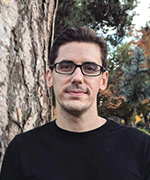
Matthew (Matt) Bruce
B.S., Neuroscience
mbruce@ucdavis.edu
Matt is a 5th year Immunology PhD student. His work focuses mainly on the development and phenotyping of preclinical MAR-ASD models to unravel the mechanisms behind autoantibody-induced developmental deficits. He hails from Pennsylvania and received his B.S. in Neuroscience from Temple University. His long-term goals involve a research career studying developmental neuroimmunology. Outside of the lab, Matt is an advocate for STEM education in prisons and enjoys studying cryptocurrency technologies.
Hobbies: studying cryptocurrency technologies and kayak.
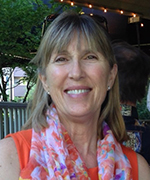
Lori Haapanen
ldhaapanen@ucdavis.edu
Lori is a Project Manager for the Van de Water Lab IDDRC Biological and Molecular Analysis CORE C. The CORE supports IDDRC specific research as well as re-charge requests from internal UC clients and external UC clients. Lori has 38 years of experience in immunology Lab Science including assay experience in luminex, Western Blots, ELISA, dot blots and protein quantification assays. Lori has a Bachelors’ degree from UC Davis.
Hobbies: hobbies that she loves doing with her family include scuba diving, hiking and singing.
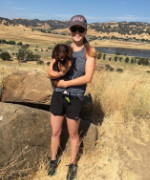
Janna Johnson
B.S., Global Disease Biology
janjohnson@ucdavis.edu
Janna joined the lab in 2020 as an Immunology PhD student. She grew up just outside of Detroit, Michigan and she received her B.S. in Global Disease Biology at UC Davis. Her research interests involve understanding the impact of maternal autoantibodies on offspring neurodevelopment.
Hobbies: when not in lab, Janna loves spending time with her family, which includes two miniature dachshunds, Gunther and Finn! She also enjoys baking, working out, and napping with her dogs.
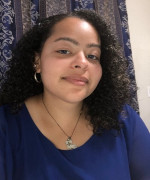
Chelsea Kelland
B.S., Biology, Minor Chemistry and Spanish
ckellend@ucdavis.edu
Her research interest is characterizing the basal immune response and maternal immune response in non-human primate models as it relates to abnormal neural development in offspring. She plans to pursue a career in academia. Moreover, she hopes to use her personal experiences to mentor undergraduate students who are underrepresented in the field of biomedical research.
Hobbies: she is an action/scary movie and trivia fanatic so you can probably catch her heading to Regal cinema for the newest release or somewhere downtown joining trivia night
Fun fact: once upon a time, Chelsea was a self-taught heavy lifter (deadlift 275lb at 5’4’’) and with COVID restrictions loosening, she plans to return to the gym and get back to lifting!

Danielle (Dani) Kim
B.S., Environmental Science, Engineering and Cognitive Sciences | M.S. Environmental Microbiology
hjdkim@ucdavis.edu
Dani is a 4th year Immunology Ph.D. student. Her research focuses on understanding how abnormal levels of cytokines/chemokines in moms may impact fetal neurodevelopment in both humans and non-human primates. She is originally from Seoul, South Korea but spent almost a decade in Warsaw, Poland during her teenage life. She received her B.S. and M.S. in Korea University, Korea.
Hobbies: enjoys film photography (she has six film cameras), working out, hiking (although she went on hiking only twice in her life), chillaxing in general.
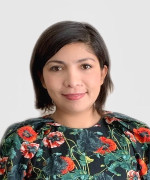
Alexandra (Ale) Ramirez-Celis
B.S., Biology | M.S., Biotechnology
aleramirezcelis@ucdavis.edu
Ale is an Immunology Ph.D. student. She studies the relationship between specific maternal autoantibodies and a subtype of autism known as Maternal Autoantibody Related ASD (MAR-ASD). She works in the clinical part of projects and uses human samples to elucidate the relationship between specific maternal autoantibodies and autism in their children. She received her B.S. in Biology and M.S. in Biotechnology at Universidad Autonoma de Aguascalientes, Mexico.
Hobbies: loves watching cartoons, doing crafts with her 4-year-old son, spending time outdoors with her family, and eating tacos (as a proud Mexican).
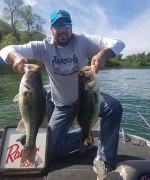
Joseph (Joe) Schauer
B.S., Biotechnology
jdschauer@ucdavis.edu
Joe has worked as a technician for the Van de Water Lab for over 10 years. He previously worked in NYC at Rockefeller University. He also had lived in Phuket, Thailand for 5 years and worked as a teacher.
Hobbies: golfing, snowboarding, fishing, playing pool, working out, trying new foods.
Postdoctoral Fellows
We are interested in talented postdoctoral fellows to complement our team working in neuroimmunology. Please send your CV and a cover letter to Judy to inquire about potential openings. Don’t forget to include the reason for your interest in our lab and why you would be a good fit!
Graduate Students
Please contact the Graduate Group of Immunology for information about rotating in our lab!
